 The Music Man offers a bit of extra Whiz Bang for your buck. 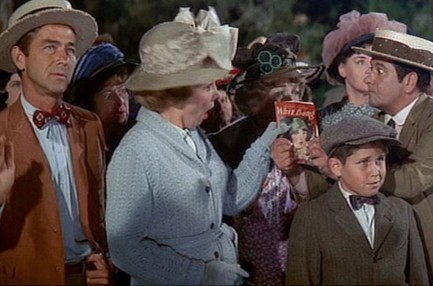
We got an e-mail from Bill S., who writes about our Capt. Billy’s Whiz Bang posting from last week: Speaking of, said periodical is numbered among “the tell-tale signs of corruption” by Prof. Harold Hill, the Music Man, when he terrorizes the good people of River City with the horrors of Trouble with a capital T and that rhymes with P and that stands for Pool.
“Is he memorizing jokes from Capt. Billy’s Whiz Bang?”
Saw your post and went for my dvd copy of the great movie, as much about changing times as it is about music. Grabbed a screen shot of Buddy Hackett exposing a young lad as a Capt Billy’s reader to his mother. Love your site. You can see in Bill S.'s screen grab that, sure enough, Buddy Hackett is holding a copy of Whiz Bang. Meanwhile, Robert Preston is singing: “Is there a nicotine stain on his index finger? A dime novel hidden in the corncrib? Is he starting to memorize jokes from Captain Billy's Whiz Bang?” But Hollywood may have been taking liberties with the time period here, since the first Whiz Bang was published in 1919 and The Music Man is seemingly set years earlier. Bill S. responded: Prof. Hill lies about being a grad of Gary Conservatory ’05 (“aught five”) and since Preston looks like no spring chicken, I added 15 or so years. Gets it in the range of the mag. Seems like turn-of-the-century but out in Iowa there might have been a lag. Still might. And so Hackett may just be yanking Capt. Billy’s Whiz Bang #1 out of the kid's pocket. The birth of modern pulp.
Re: the subtle subtext of a new era: it starts with the opening number, actually a “rap” about all the products the traveling salesman can no longer sell, and that even the profession of the drummer may already be obsolete. Hill’s nemesis sells anvils and carries a sample with him. Hill sells band instruments from a catalog by drop ship. He also peddles a teaching philosophy akin to modern self-help fads. The Think Method. And then there’s the unknotting of Shirley Jones’ repression. Oh my! Has any woman ever looked better in a movie?
An underappreciated work, that Music Man. Ripe for ridicule because of the obviousness of well-known show stoppers, but the love song was covered by the Beatles.
Have to agree about the movie. It’s a good laugh. Even that famous Whiz Bang number—the song “Trouble”—is quite funny. If you get a chance, check it out here. It’s worth your time. When Hackett pulls out the magazine—around the 3:00 mark—you can see the cover clearly, and it’s the one below. What Bill says about Shirley Jones is true, also. She’s very tempting. See the post below.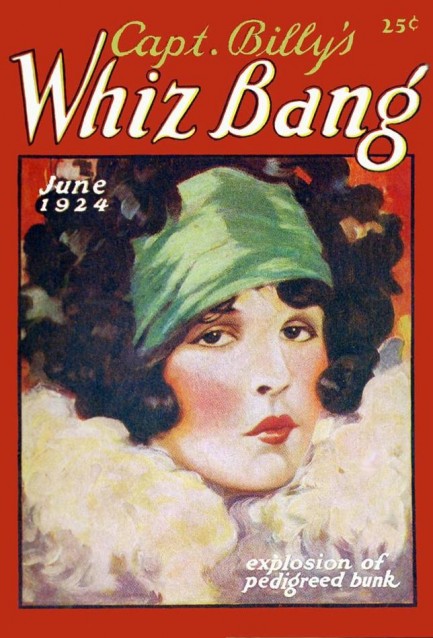
 Who knew moving could make such a mess? 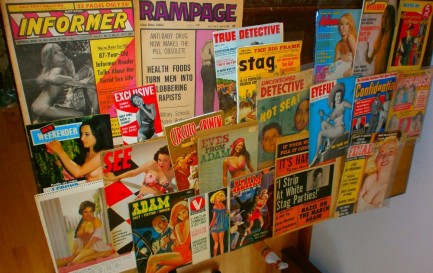 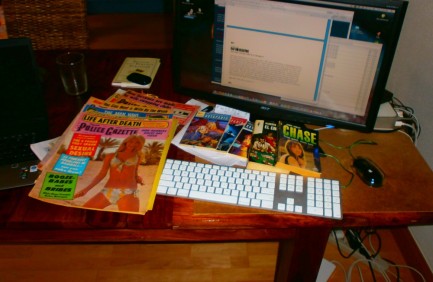
Last week we showed you our copy of Capt. Billy’s Whiz Bang and directed you to Darwnination because that website had the full issue already scanned. It seems a good time to point those of you interested in mid-century magazines toward Darwination again. It’s one of only a few sites on the internet that makes entire scans available for free. One day, when we’ve got some time, we may remodel Pulp Intl. a bit so that you can download full publications here, but for now we have too many other obligations, including earning money, building another website, painting our new place some color other than white, restoring the 150-year-old French desk underneath those magazines, getting our computer gear off the dining table and into the office where it belongs, and of course, giving all the attention we can to the eternally patient Pulp girls, who some days of the week might as well be widows. After a busy weekend, we don’t have anything really prepared for today, but we will get to scanning and posting everything you see above, plus exponentially more stuff that remains packed away, including a large supply of Japanese movie posters. Back to our regular schedule tomorrow.
 He convinced everybody they needed to take a Whiz. 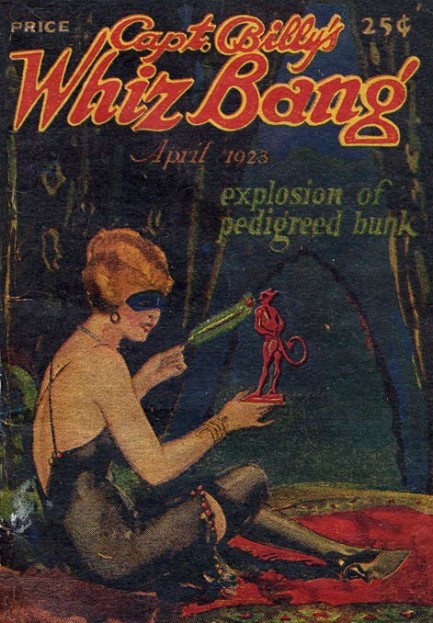
Above is the cover of the bawdy humor magazine Capt. Billy’s Whiz Bang. The monthly was launched out of Robbinsdale, Minnesota in 1919 by Wilford Fawcett, who came up with the unusual name by combining his own nickname with the phrase soldiers used to describe the sound of artillery shells. Capt. Billy’s Whiz Bang began with a run of only 500 issues, had no art or photos, and seemingly never carried revenue-generating advertising save for sometimes on the inside front cover. The content was short stories, limericks, anecdotes, and one-liners, much of which would rightly be considered sexist, racist, or just plain unfunny today. On the other hand, some of it is rather cute. We liked this limerick: Of Course Not Carefully she rouges her dimpled knees,
Then adds a powdery sheen,
Do you think she does this little stunt,
If she thinks they won't be seen?
Well, maybe it isn't so great. But did you have any idea women once rouged their knees? That just blew us away. Anyway, from the humble seed of Capt. Billy’s Whiz Bang sprang the entire Fawcett Publishing empire, which at its height consisted of more than 60 separate magazine imprints and made Wilford Fawcett an international celebrity. Later, Fawcett Publishing launched Gold Medal books, where Kurt Vonnegut and John D. MacDonald, among many other notables, got their starts. This issue of Whiz Bang appeared this month in 1923, and thanks to the website Darwination you can read it by downloading their copy here. As a bonus, below are five more covers that came from MagazineArt.org, where you can see a fuller collection.
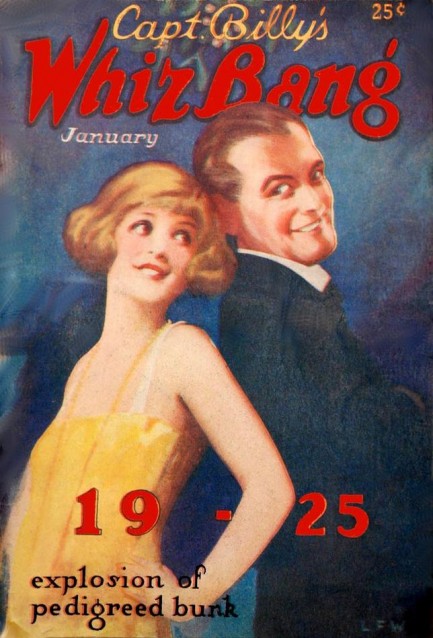 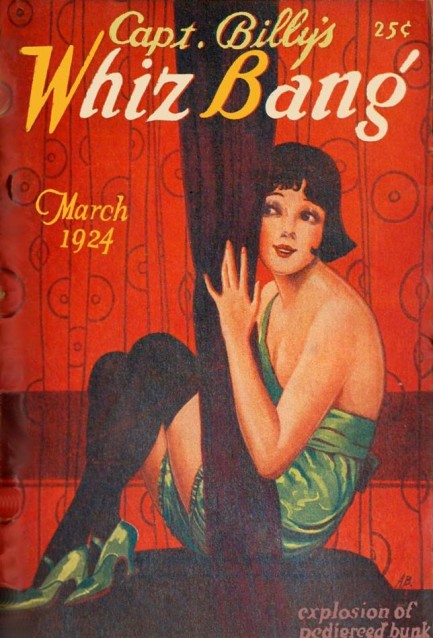 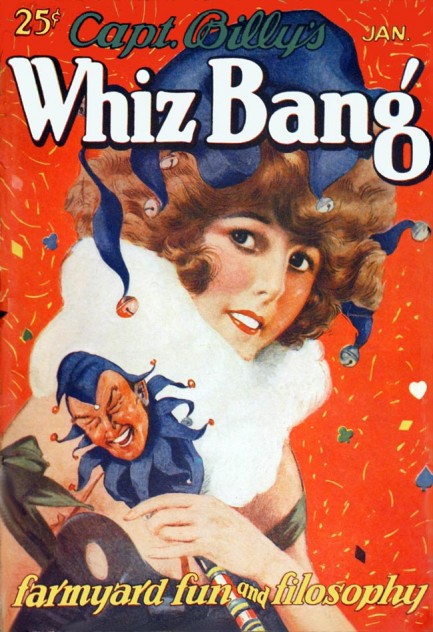 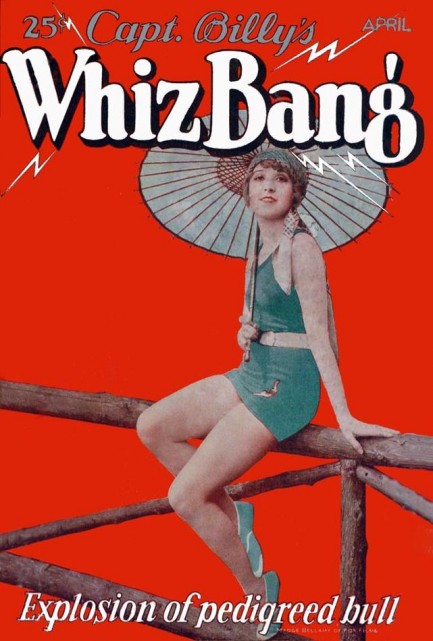 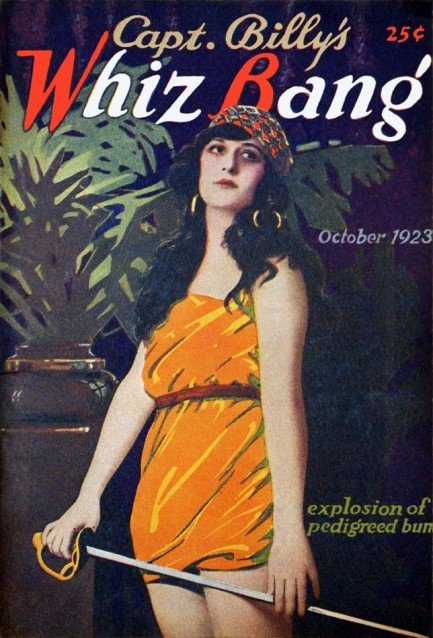
|
 |

The headlines that mattered yesteryear.
2003—Hope Dies
Film legend Bob Hope dies of pneumonia two months after celebrating his 100th birthday. 1945—Churchill Given the Sack
In spite of admiring Winston Churchill as a great wartime leader, Britons elect
Clement Attlee the nation's new prime minister in a sweeping victory for the Labour Party over the Conservatives. 1952—Evita Peron Dies
Eva Duarte de Peron, aka Evita, wife of the president of the Argentine Republic, dies from cancer at age 33. Evita had brought the working classes into a position of political power never witnessed before, but was hated by the nation's powerful military class. She is lain to rest in Milan, Italy in a secret grave under a nun's name, but is eventually returned to Argentina for reburial beside her husband in 1974. 1943—Mussolini Calls It Quits
Italian dictator Benito Mussolini steps down as head of the armed forces and the government. It soon becomes clear that Il Duce did not relinquish power voluntarily, but was forced to resign after former Fascist colleagues turned against him. He is later installed by Germany as leader of the Italian Social Republic in the north of the country, but is killed by partisans in 1945.
|

|
|

It's easy. We have an uploader that makes it a snap. Use it to submit your art, text, header, and subhead. Your post can be funny, serious, or anything in between, as long as it's vintage pulp. You'll get a byline and experience the fleeting pride of free authorship. We'll edit your post for typos, but the rest is up to you. Click here to give us your best shot.

|
|

















































































